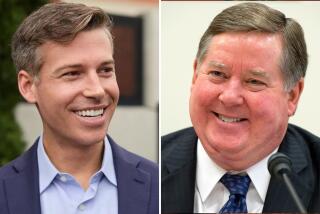McCarthy to Run for Cranston’s Senate Seat
- Share via
Lt. Gov. Leo T. McCarthy, fresh from his 1990 reelection campaign, announced Thursday that he will dive into the political pond again with a bid for the seat now held by retiring Sen. Alan Cranston.
McCarthy, a Democrat, said in an interview that he is entering the 1992 race because the concurrent Gulf War and national recession “drive home to me that I could be playing a major role in the Senate to help my state and my country.”
“I feel very, very confident,” he said.
McCarthy’s announcement adds to an already crowded Democratic field for the Cranston seat, one of two up for election in 1992. U.S. Rep. Robert T. Matsui of Sacramento and former Gov. Edmund G. Brown Jr. already have declared themselves candidates, and a handful of other Democrats are considering a bid. No Republicans have officially entered the race, but much jockeying continues.
McCarthy’s decision to run for Senate--which he said he reached Thursday--comes three months after he coasted to a 52%-42% victory in the lieutenant governor’s race over state Sen. Marian Bergeson of Newport Beach, the Republican nominee.
The campaign helped McCarthy consolidate a broad fund-raising base that he can be expected to mine for the next year as the 1992 election approaches. McCarthy said he has a “very solid core base of major donors and 50,000 small donors.”
The 1992 race will mark McCarthy’s second bid to move from Sacramento to Washington. In 1988, he challenged then-incumbent Sen. Pete Wilson and was soundly defeated in what was the nation’s most expensive Senate race that year.
That contest, McCarthy said, occurred in “a completely different world.”
“There is no one who represents the Pete Wilson kind of power in this race,” he said. “There’s no incumbent; there’s no one in the primary. . . . It’s a completely different set of choices.”
The lieutenant governor said his miscues in 1988 would help him the next time out.
“You really have to go through a tough race to learn what to do and not to do,” he said.
According to McCarthy, the outcome of the 1990 elections had much to do with his decision to seek the Cranston seat. Had Democrat Dianne Feinstein seized the governorship, McCarthy could potentially have exercised much more power than he can now as a Democrat in a Republican-led administration.
In his bid for reelection, McCarthy pressed Bergeson on her opposition to abortion rights and portrayed himself as tough on criminals. Part of his campaign strategy rested on his championing of Proposition 133, the initiative that would have increased the state’s sales tax by a half-cent to pay for drug education, treatment programs and law enforcement. While the initiative was swept away 2 to 1, McCarthy easily won reelection by a 10-point margin.
During the upcoming election, McCarthy said, he will stress a reconstruction of the country’s--and the state’s--economic power.
“We ought to be moving . . . toward restoring the United States to unquestionably the No. 1 economic power,” he said.
Besides Brown and Matsui, U.S. Rep. Mel Levine of Los Angeles is expected to join the Democratic primary for the Cranston seat. Fellow member of Congress Barbara Boxer has said she is running for the Senate, but has yet to address which of the two seats she seeks.
The second seat is held by John Seymour, who was appointed to the Senate after Wilson won the governorship. Already, conservative U.S. Rep. William Dannemeyer of Fullerton has announced he will challenge Seymour in the Republican primary. Feinstein has announced that she will seek the Democratic nomination for that seat and has so far co-opted the Democratic field.
The Cranston seat is available for a full six-year term, while the Seymour seat will have to be contested again in 1994--the year it would have been up for election if Wilson had stayed in the Senate.
More to Read
Get the L.A. Times Politics newsletter
Deeply reported insights into legislation, politics and policy from Sacramento, Washington and beyond. In your inbox twice per week.
You may occasionally receive promotional content from the Los Angeles Times.











